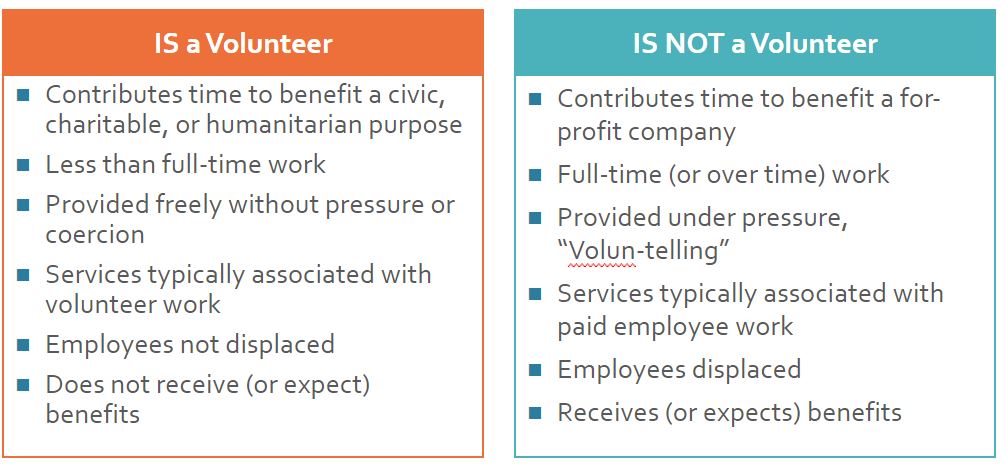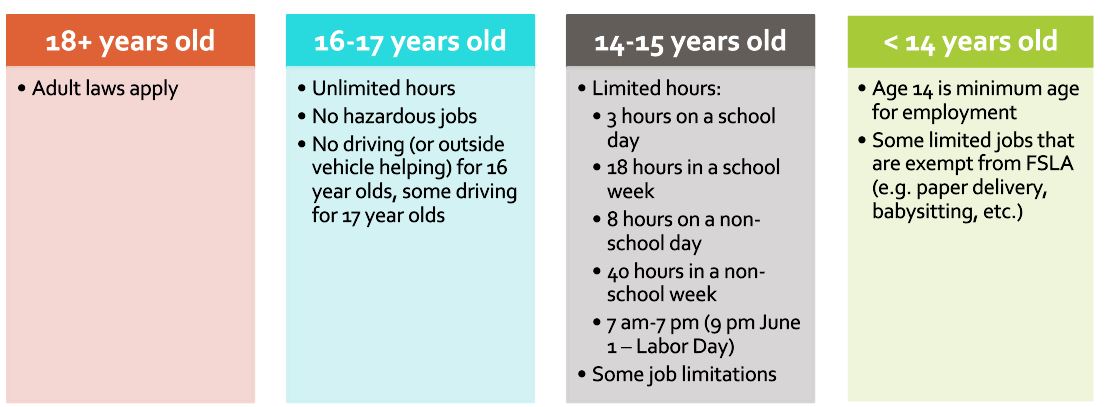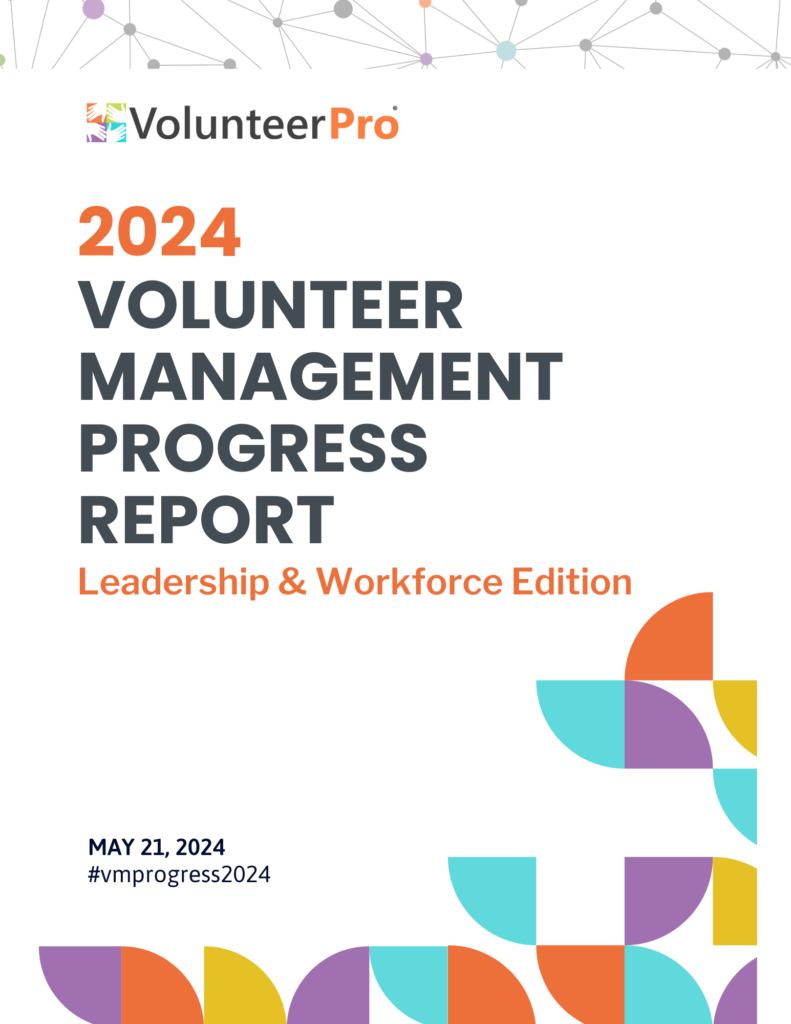Volunteers and the Law: Legal Considerations
for Your Nonprofit
Many organizations are either unclear or unaware of how volunteers and the law intersect. This post walks you through all of the details.
One caveat, though. While this post offers up general guidelines and source references, it is not intended to be legal advice. When creating or updating policies that concern volunteers and others who serve your organization, it is always a good practice to consult with a legal professional.
Don’t have a labor attorney on retainer? No worries! Search for a local bar association in your area and reach out to them to connect with a pro bono attorney who specializes in labor law.
Managing volunteers legally and ethically can be tricky if you aren’t aware of how laws, rules, regulations, and/or policies affect the work they can do for your organization.
Most nonprofits would like to abide by the law, but most staff aren’t up to date on which laws exist and how they should be applied to their situation.
So, it’s worth it to do your due diligence in order to understand your rights and obligations under the law. That way you can ensure full rights and protections for volunteers and those they serve.
If you are wondering if you’re breaking the law (or ethical codes) when it comes to volunteers, we’ve got you covered.
In this blog, we’ll review a framework for understanding which laws affect volunteers and discuss how they impact your volunteer program. While this blog will focus on US law, we will cover concepts that are universal for any context.
What is a Volunteer?
According to the US Department of Labor, a volunteer is: an “individual who performs hours of service… for civic, charitable, or humanitarian reasons, without promise, expectation or receipt of compensation for services rendered.”
In Canada, volunteers are defined as people “who give their services without any express or implied promise of remuneration.”
The United Nations has described volunteer activity as activity that is not undertaken for financial reward, that is undertaken voluntarily, and that benefits someone other than the volunteer.
“True” volunteers are those who:
- Work toward public service, religious, or humanitarian objectives;
- Do not expect or receive compensation for services; and
- Do not displace any genuine employees.
Here’s another way of looking at it:

What about Interns?
Interns are a special case; they can be considered volunteers OR employees. The difference between a paid intern and an employee is really one of semantics.
If interns are paid, then an employment relationship exists and minimum wage and other legal protections applicable to employees are available to paid interns as well.
Here are some criteria you can use to determine the difference between interns and your employees, and volunteers:
-
- Similar to training given in an educational environment;
- For the benefit of the intern;
- Does not displace regular employees, but works under close supervision of existing staff;
- Employer derives no immediate advantage (on occasion its operations may actually be impeded);
- Intern is not entitled to a job at the conclusion; and
- Both understand that the intern is not entitled to wages.
Employees as Volunteers
We get asked this question a lot at VolunteerPro! What do you do when an employee wants to volunteer at your organization?
Generally speaking, this is permissible if you follow the guidelines below:
-
- Employees cannot provide volunteer services that are “the same as, similar, or related to” their regular job duties
- Nonprofits cannot require employees to perform volunteer work during the employee’s normal working hours (even if it’s different than their job)
- Nonprofits can only provide nominal perks or rewards for employees who serve as volunteers
Volunteer Perks & the Law
What about giving volunteers “a little something” for their service?
Beware of this practice and make sure you understand all of the consequences of doing so.
In general, a nonprofit employer must treat payments to volunteers the same as payments to employees, which means that income tax and FICA contributions must be withheld. Living allowances, stipends and in-kind benefits should generally be treated like wages.
With these tax liabilities in mind, nonprofits should exercise caution with respect to the type of perks or rewards given to volunteers for their services.
While volunteers may be provided with nominal and occasional perks and rewards for their services (such as snacks or certificates of achievement), actual payments in the form of stipends and/or products of meaningful monetary value (including gift cards) may be interpreted by the Department of Labor and the Internal Revenue Service as compensation for services, which may cause a putative volunteer to be classified as an employee.
Instead of facing a potential legal pitfall, simply follow some of our suggestions on how to show volunteers you appreciate them!
If you decide you want to offer items with a value, be sure to review these guidelines first.
Laws that May Affect How You Work with Volunteers
Volunteers can do a lot of good for your organization, make sure you are taking steps to protect them!
Here are some laws (US laws, please look for similar laws in your country), that you should be aware of when designing volunteer roles, policies, and procedures.
Federal Child Labor Laws
Unfortunately, federal child labor laws DO NOT apply to volunteers, but if you allow youth volunteers you might want to be aware of what they entail!
There are also several states that regulate the hours that young workers under age 18 may work, so check with your State’s Department of Labor to see what you should be your baseline for involving youth volunteers.
In addition, state parental consent laws may include the parent’s right to be involved in their minor child’s education, including the right to approve or disapprove of certain curricula, or to consent to extracurricular activity and field trips.
Become familiar with how these might affect youth volunteers. Even if they do not directly apply to unpaid volunteers, they are helpful to consider.
Here’s a quick look at the US Federal Child Labor Laws:

Certification and Licensure
When it comes to specialized volunteer roles, think counseling or medical roles, certification and licensure requirements will differ based on the volunteer role and your organization’s policies.
To avoid claims of discrimination, make sure the requirements are the same for anyone in that role.
Fair Credit Reporting Act (FCRA)
In the US, the Consumer Financial Protection Bureau is responsible for ensuring laws like the Fair Credit Reporting Act (FCRA) are followed. Because e-commerce is often conducted across national boundaries, the Act can also be applied outside the US.
The FCRA related to background checks, in general, and applies to volunteer background checks as well.
To comply with the FCRA, nonprofits must do three things when they are administering volunteer background checks as part of their screening process:
1) Get consent
2) Be transparent
3) Follow a specific process every time
We recommend you follow the process below:
Before You Screen
-
- Get consent to conduct background check
- Be transparent about how info will be used
Pre-Adverse Reaction Process (before you deny a volunteer due to the results of the check)
-
- Advise the volunteer of the results
- Provide the name of credit agency
- Inform volunteers that they have a right to dispute
- Give them a copy of the report & Summary of Rights
Adverse Reaction Process (when you alert the volunteer that they have not been approved)
-
- Provide written notification
- Disclose why the decision was made by the organization
- Inform volunteers that the decision was not made by a credit agency
For a more in-depth look at background checks and volunteers, see Do You Make These 3 Mistakes on Volunteer Background Checks?.
What Laws Often Don’t Apply to Volunteers
While there are some laws and provisions that generally apply to volunteers, there are a few that often don’t. Below are two areas where organizations are often mistaken about whether they cover volunteers. Below are the details.
Health Insurance Portability and Accountability Act of 1996 (HIPAA) Privacy Rule
HIPPA is related to the privacy of medical records, protected health information, and provides health care consumers with more rights and control over their information.
It’s important to note that HIPPA only applies to HIPAA-covered entities, which are:
-
- Health Plans – Health insurance companies, HMOs, or health maintenance organizations, Employer-sponsored health plans, government programs
- Clearinghouses – organizations that process nonstandard health information to conform to data standards
- Providers – who submit HIPAA transactions, like claims, electronically are covered. Doctors, Clinics, Psychologists, Dentists, Chiropractors, Nursing homes, Pharmacies
- Business Associates – assist with claims processing, utilization reviews, translating a claim from a nonstandard format, independent medical transcriptionist, etc.
If you determine that your organization is a covered entity, then it is important that you follow the law when it comes to privacy of medical records. However, HIPPA does not relate to employment or personnel records, even if there are health-related in nature and even if the employer is a covered entity.
For more info, check out what the US Health and Human Services Department says about this here.
Workers Compensation Insurance
Since volunteers are not paid employees, they’re typically not covered under workers’ compensation in most states or by most insurers.
To see if a volunteer qualifies in your state, please review its workers’ compensation law carefully.
It’s important to understand coverage for one major reason – If a volunteer gets hurt on the job and needs medical attention, who will pay for the medical bills?
In general, your organization’s liability or umbrella insurance policies will include volunteers. If the volunteer causes an injury or property damage to a resident, patient, or visitor, the general liability policy would provide protection. But the volunteer cannot make a claim against another insured and could not typically collect benefits for medical coverage.
That said, there are solid reasons why volunteers should be covered under a separate policy. William Henry at Volunteers Insurance Service Association (VIS) explains,
“It’s true that general liability policies typically include volunteers, and at no additional premium. However, it’s not wise for organizations to allow that. When they do, they are sharing their limits of liability with volunteers — creating the potential for an underinsured claim if both the volunteer and the organization are named as defendants in a lawsuit. (The insurance company does not care how the claim dollars are allocated. They will pay only up to the limit of liability — typically $1 million per occurrence.) The better approach is to exclude volunteers from the general liability policy (easy to do), and insure them separately. That way, the organization’s own limits of liability, and claims experience are protected.”
See the VIS blog post Why a Nonprofit Organization Should Insure Volunteers Separately for additional details.
Check your policy to see who is covered and how, and ask your insurance broker if you have specific questions that need to be addressed.
Finally, unpaid student interns participating in a school-approved internship, may or may not be covered by the school.
Ask the educational institution whether coverage is provided if the intern gets hurt while volunteering or causes someone else to get hurt. If so, get a copy of the school’s certificate of insurance.
Good Samaritan Laws and Volunteers
Both the federal government and many states have laws in place that are designed to protect volunteers from legal liability. However, they do not protect volunteers from lawsuits.
Because of this, your organization should insider what insurance might be put in place to protect volunteers if something were to go wrong and a lawsuit (however unlikely it might be to be won) ensued.
In addition, in terms of training volunteers, you should ensure that volunteers understand the limits of the law and are prepared to protect themselves from liability.
It is vital that they understand that they are not protected when they work outside their training and authorized role.
The Federal Volunteer Protection Act of 1997 provides immunity for volunteers for harm caused by their acts or omissions, but only under certain circumstances:
- The volunteer was acting within the scope of his or her responsibilities;
- The scope of a volunteer’s responsibility is defined by the position description and the breadth of an individual’s training and certification;
- The volunteer was properly licensed, certified, or authorized to act;
- The harm was not caused by willful, criminal, or reckless misconduct, gross negligence or conscious, flagrant indifference to the rights or safety of others; and
- The harm was not caused by the volunteer operating a motor vehicle, vessel, or aircraft to which the State requires an operator’s license and insurance.
General Wrongdoing and Mayhem
Yes, volunteers are superheroes, but being a volunteer doesn’t exempt people from other laws of the land!
To ensure that you are running a lawful volunteer program, ensure you are aware of any of the following laws and have a process documented for how you will respond should one of these illegal activities occur:
-
- Misappropriation of Intellectual Property
- Fraud & Abuse
- Identify Theft
- Sexual Harassment
Build Ethical Volunteer Management Practices

Where laws leave off, ethics should take over.
Maintaining a certain code of ethical standards is important for the field of volunteer management, especially if you want to advocate for the advancement of your career.
The Council for Certification in Volunteer Administration (CCVA) has developed some core values and principles that every volunteer coordinator should know.
Also, candidates for the CVA certification are required to affirm their intent to uphold these ethical standards.
Read more about the CCVA Ethics Framework below.
Professional Ethics in Volunteer Administration: Core Values and Principles
CITIZENSHIP: The Administrator of Volunteers understands that volunteerism is a foundation of civil societies and guides the organization and its stakeholders toward active community participation.
-
- Philosophy of Volunteerism: Maintain a clear personal philosophy on volunteerism and support the development of an organizational philosophy on volunteer engagement.
- Social Responsibility: Facilitate a compassionate and caring culture through which community needs are met and shared values are enhanced.
- Philanthropy: Cultivate and model the generosity of spirit, time and resources to further volunteer engagement and meet community needs.
RESPECT: The Administrator of Volunteers acknowledges the inherent value, skills and abilities of all individuals and affirms the mutual benefit gained by the volunteer and the organization.
-
- Dignity: Act in a compassionate manner that upholds the right of all volunteers to be valued and involved in decisions that affect them.
- Inclusivity: Encourage and facilitate the participation of individuals from diverse backgrounds, perspectives and abilities.
- Privacy: Protect the privacy of individuals and information considered confidential.
ACCOUNTABILITY: The Administrator of Volunteers demonstrates responsibility to the organization, its stakeholders and the profession of volunteer administration.
-
- Collaboration: Include stakeholders in the development and support of volunteer engagement and cultivate partnerships to enhance the impact of volunteers.
- Continuous Improvement: Pursue excellence by enhancing professional competence, maintaining certifications and fostering innovation.
- Professionalism: Provide outstanding service to the organization and the people it serves while upholding personal and professional boundaries in all interactions.
FAIRNESS: The Administrator of Volunteers commits to individual and collective efforts that build and support a fair and just organizational culture.
-
- Impartiality: Remain unbiased and objective when working with stakeholders.
- Equity: Ensure access to opportunities, resources and support which enable volunteers to be successful.
- Justice: Implement open and consistent processes that inform decision‐making and address discriminatory or prejudicial behaviors.
TRUST: The Administrator of Volunteers maintains loyal and trusting relationships with all stakeholders and is dedicated to providing a safe environment based on established standards of practice.
-
- Honesty: Commit to the truth and strive for transparency.
- Integrity: Demonstrate consistency between word and action by practicing ethical decision‐making and addressing conflicts of interest.
- Commitment: Act in a forthright manner with sincere good intent and follow through on promises and agreements.
(Courtesy of the CCVA)
All employees, whether they be the volunteer coordinator or the executive director, should align their practices with these guidelines. They will not only indicate that your organization is worthy of the valuable contributions volunteers make, but also they will help your organization reap the benefits of solid volunteer program management made clear in the principles above.
Volunteers and the Law: Your Next Steps
Now that you understand how volunteers fit into the context of various laws, take time to review and assess your organization’s preparation to address current legal issues relevant to volunteer involvement.
This will help you focus on your next steps – to develop or update existing policies and procedures that will protect everyone.
While you’re at it, why not refresh those dry about boring volunteer forms and documents, Check out Spring Cleaning: How to Refresh Your Volunteer Program Documents for inspiration
Finally, let us know in the comments …
Based on what you’ve learned today, what’s one thing you plan to do differently going forward?









Leave A Comment